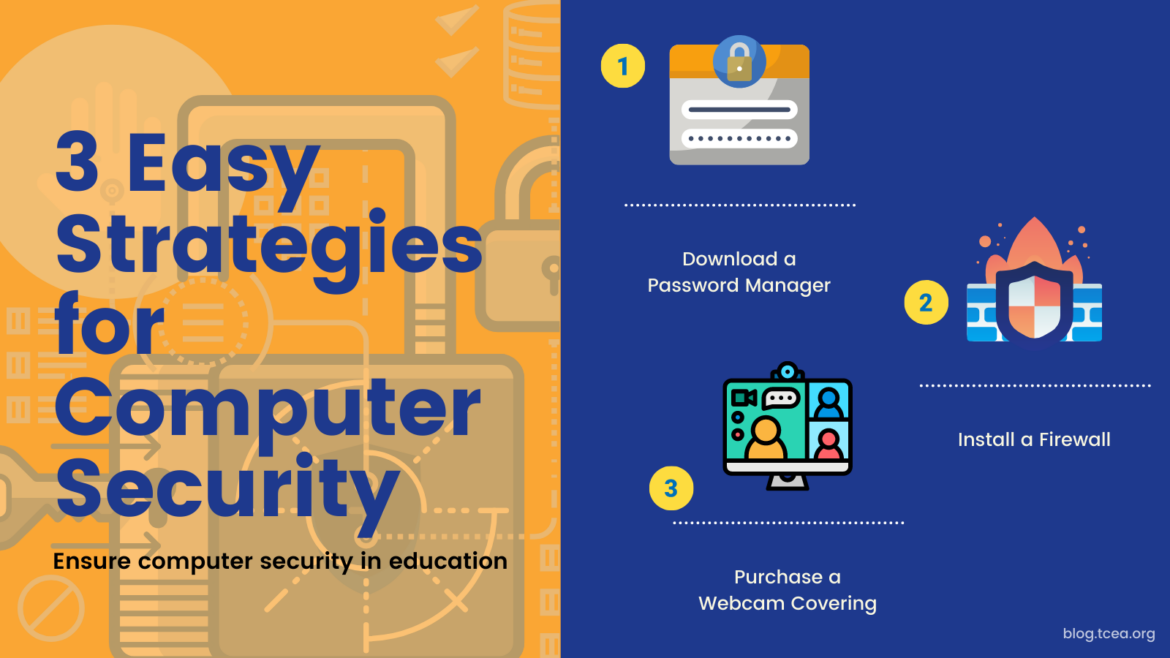November is a big month for computer security. The 30th happens to be National Computer Security Day, a nice reminder for students to reflect on their “digital hygiene” and assess what might be going well and where improvements could be made. If not reminded, students may forget that they should back up their electronic devices, run antivirus programs, and watch out for any suspicious websites they may come across regularly. This is especially important if they are using loaned or borrowed equipment for extended periods of time from their schools.
Some students may feel confused when it comes to protecting their laptops and devices, but there are some easy strategies educators can implement, whether teaching in person or virtually, to help their learners feel empowered and safe online. There are plenty of computer security tools available that offer a variety of benefits and fit most budgets, so it is important to assess what exactly your students’ needs are within the classroom environment to make the best decision for you.
Download a Password Manager
Generally speaking, the more services that are offered online means the more online accounts one has to make in order to use those services. More online accounts means there are more passwords to remember, and most people default to using different variations of the same password because it is easier to remember. Although convenient, this poses a security risk. If there was ever a data breach, your password could be used by a hacker to log into your other accounts and steal sensitive information.
On the other hand, some people are good at creating unique passwords, but are bad at remembering them. A common way this is dealt with is either by writing each unique account down on paper or on a note-taking app on a frequently-used device. Paper is the preferred method here, as an electronic copy of all your private information could easily be deleted or corrupted, but paper can just as easily be thrown out or discarded by accident as well.
To prevent either scenario from happening, there are programs called password managers that you can download which store your information in one easy place on your laptop or computer. This is a great tool for students because they may forget what they set their passwords to, and a password manager can easily find and populate your account information into login screens.
Install a Firewall
Securing your digital accounts is a great step in the right direction for digital hygiene. Next, you might want to take a look at your computer’s network security. Most computers offer some type of malware protection as an add-on when it is first purchased, but it is a good idea to check your computer to see if you have protection or if it may be expired.
If you discover that most of the classroom computers don’t have adequate protection, consider investing in a next-gen firewall program. Firewall technology can detect potential threats in web traffic before they reach your system, which is definitely an advantage if you’re teaching full classes, virtually or in person. The added security of advanced systems may not be the first thing administrators would want to consider spending their budgets on, but it will surely be worth the money saved on potential cyberattacks as schools continue to navigate learning from home. Alternatively, there are a few cheap or free options for securing data.
Purchase a Webcam Covering
One of the easiest ways to make an immediate impact to your personal security on your device is to buy a cover for your webcam. In the current Zoom Era, video conference meetings are the so-called new normal, and it might be worth having manual control over who can and cannot see you.
Although you can turn your front-facing camera off in your settings, it might be worth it to place a physical covering over the camera when you are done with meetings for the day. It can give parents peace of mind knowing that their families aren’t being watched if they are at risk of a cyberthreat, and it also adds another layer of protection against potentially awkward Zoom mishaps.
The end of November marks the beginning of the festive holiday season which is going to be celebrated very differently this year than years before. Families will be relying on their tech devices working properly now more than ever to help spread the merry spirit, and viruses are going to be the last thing on everyone’s minds. To help the holidays run a bit more smoothly this year, consider using one or two of these strategies and tools to help keep everyone’s spirits bright.
Photo by cottonbro from Pexels


1 comment
Hi, what an interesting post!
Computer networks that enhance communication crossways the globe have created a world that never existed before. The issues facing computer use such as defense, ethics, and privacy continue to rise with the advent of extra ways of information exchange (https://ivypanda.com/essays/key-issues-concerning-computer-security-ethics-and-privacy/).
So, the information in your post was really helpful. Thank you for sharing!